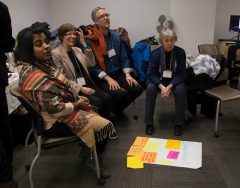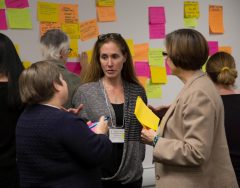by Magda Goemans, CFICE RA, Evaluation and Analysis Working Group
Following our CFICE Phase I evaluation activity — which took place between January and August 2016, and involved an examination of the first four years (Phase I) of the CFICE project — the Evaluation and Analysis Working Group (EA WG) began to plan how to process and share our evaluation results. This was no easy task since the six hub-specific evaluation summary reports yielded over 200+ pages of summarized content. In addition, the EA WG wanted to ensure that any analysis of the data remained true to the stories shared by community and academic partners during the Phase I evaluation process. In the end, the EA WG felt that the best way to share and collaboratively analyze the data was through an event that brought together community and academic partners from across Canada and from all of the six CFICE hubs: Community Food Security, Violence Against Women, Poverty Reduction, Community Environmental Sustainability-Ottawa, Community Environmental Sustainability-Peterborough-Haliburton, and Knowledge Mobilization.

CFICE Symposium
On January 18 and 19, 2017, CFICE hosted an event at Carleton University titled Community Impact: A community/academic symposium for clarifying, sharing and celebrating CFICE’s key messages. The symposium brought together CFICE project partners to collaboratively discuss the findings of our Phase I evaluation process, and to develop key messages and lessons from our Phase II work. The event celebrated CFICE’s impact in communities across Canada, and looked at what recommendations could be carried forward in Phase II to improve community-campus engagement work on a national scale.

CFICE Symposium
In planning the symposium, the EA WG strove to remain community-first. Realizing that the EA WG was made up of only academic participants, we established a Community Advisory Committee (CAC), which was composed of Phase I community hub partners. The Committee proved to be an important and valuable guiding force in planning the symposium agenda. The contributions of CAC members, along with those made by our facilitator, Randy Stoecker, resulted in a symposium event that prioritized opportunities to network, discuss learnings, and share stories among hub partners.

CFICE Symposium
Members of the EA WG also reviewed Phase I evaluation reports in preparation for the symposium. We synthesized the evaluation data and worked closely with CFICE community and academic partners to interpret and compile it into a Symposium Backgrounder report. The backgrounder report provided symposium participants with a general overview of the Phase I evaluation findings, and helped to ground Phase I lessons — as well as recommendations moving forward — that were further developed during the symposium.
Overall, the event was deemed a great success by symposium participants, who particularly appreciated opportunities to meet, share experiences and take part in informal conversation with other community and academic partners from across the country. They also valued the chance to voice recommendations for future CCE efforts, and some examples of recommendations that participants targeted at specific CCE audiences are shown below:
Governments (provincial, federal, local): Provide greater institutional and funding support for strong CCE partnerships between PSIs and the non-profit sector.
Funders of CCE partnerships: Support more direct funding of CBO participation, and recognize the true costs in time and resources that CBOs incur for administration and reporting.
Post-secondary institutions: Develop tenure and promotion standards that meaningfully reward community-engaged scholarship, for example by valuing the impact of non-academic outputs of CCE projects.
Faculty: Meet partners in the community, and recognize and value community knowledge and expertise.
Students: Seek out opportunities to acquire and co-create CCE skills and capacity, and mentor other students based on those experiences.
Community-based organizations: Engage strategically in CCE projects only when they add value to CBOs, and clearly communicate organizational needs to partners.